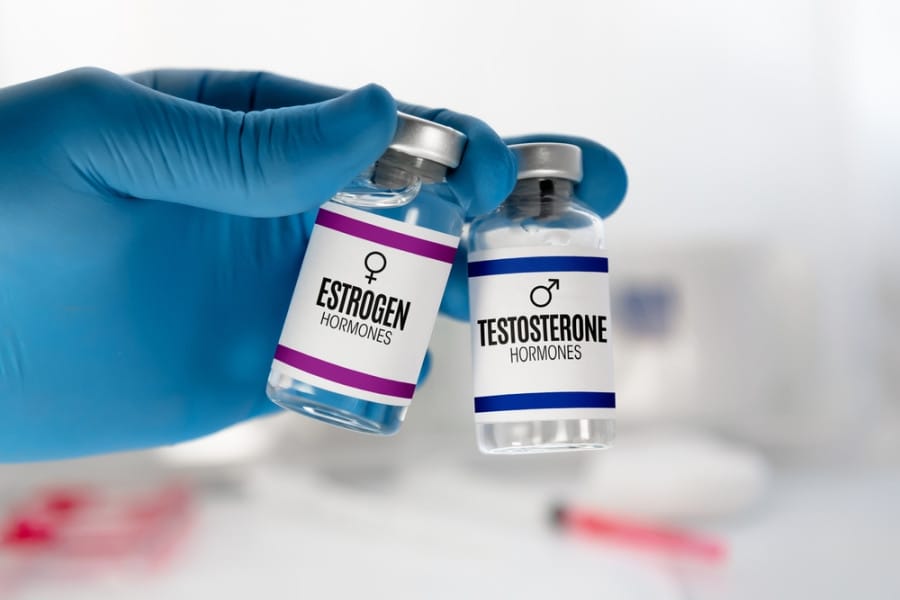How Sex Hormones Affect Exercise Performance
Sex hormones, such as estrogen and testosterone, have a significant impact on physical fitness and exercise abilities. Changes in these hormones during puberty, menstrual cycles, contraceptive use, pregnancy, and aging can affect muscle building and injury rates in both casual exercisers and professional athletes.
Understanding how these hormones affect the body can help individuals optimize their workout potential. This article will explore five ways estrogen and testosterone influence fitness and athletic performance.
Estrogen And Bone Health
Estrogen is essential for maintaining healthy bone density, particularly as women age. After menopause, estrogen levels decrease significantly, leading to rapid bone mass loss. Women can lose up to 20% of their bone density in just 5-7 years post-menopause. This bone loss increases the risk of stress fractures and osteoporosis, limiting participation in weight-bearing and high-impact exercise. Weight training and short-term estrogen replacement therapy under medical supervision can help maintain bone health, enabling women to continue to exercise safely in the long term.
Testosterone, Muscle Building, And Fat Burning
Testosterone aids in building lean muscle mass by increasing muscle protein synthesis. It prompts the body to repair and strengthen muscles after intense resistance or strength training. Inadequate testosterone makes it more challenging to build strength and muscle size. Some athletes and bodybuilders misuse anabolic steroids or testosterone supplements to maximize muscle growth, but these supplements pose health risks and should only be used therapeutically under medical supervision. Higher testosterone levels also promote fat burning, while estrogen signals fat storage, particularly around the hips and thighs.
Estrogen And Soft Tissue Injury Risk
Despite the weight loss benefits of estrogen blockers, estrogen contributes to the strength and flexibility of ligaments and tendons, reducing the risk of some injuries. Female athletes, especially those with irregular or absent periods indicating hormone imbalances, are up to 8 times more likely to experience ACL tears. Optimizing and balancing estrogen levels can lower the likelihood of soft tissue and joint injuries. However, significant drops in estrogen during menopause also hinder the muscle’s ability to recover after workouts, making overuse injuries more probable. Timing strength training to coincide with elevated hormone levels can enhance performance and recovery.
Testosterone, Energy Levels, And Endurance
Adequate testosterone is crucial for maintaining physical energy levels and mental focus during demanding athletic training and events. Testosterone enhances the production of red blood cells, improving oxygen circulation and muscle endurance. Low testosterone has been linked to reduced endurance capacity and aerobic potential, as well as increased fatigue during intense training. Hormonal imbalances that result in low testosterone can compromise an athlete’s ability to sustain power and stamina during competitions. Optimizing testosterone under medical supervision may help boost energy and physical resilience.
Estrogen And Post-Exercise Recovery
Moderate estrogen levels strengthen bones and connective tissue, but excessive drops can impede muscle repair after intense training, particularly during menopause. Low estrogen leads to slower recovery times post-workout, hindering the ability to benefit from exercise training adaptations. Supporting hormonal balance as women age can help them continue to exercise actively by improving exercise recovery and reducing the risk of overload injuries resulting from inadequate muscle rebuilding. This involves monitoring bone density for osteoporosis risk and consulting trained hormonal and gynecological health experts.
Closely monitoring changes in estrogen and testosterone levels throughout life provides valuable insight into maximizing workout potential and achieving fitness goals safely. Tailored plans should assess hormone balance through bloodwork and consider strategic estrogen or testosterone support under medical supervision where appropriate.














